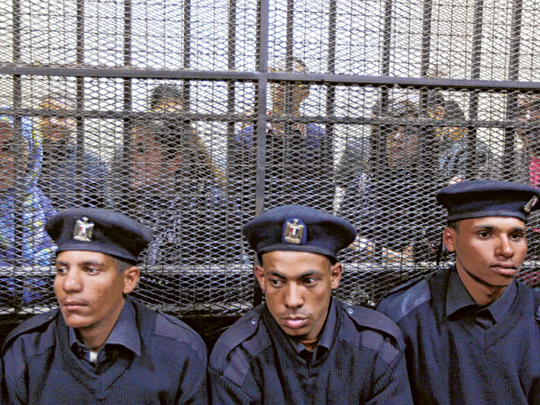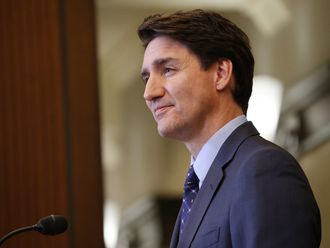
Cairo Egyptian officials said on Wednesday that they would lift a travel ban barring seven Americans from leaving the country during the politically charged prosecution of four US-financed non-profit groups here, apparently resolving a crisis that threatened to break the country's 30-year alliance with Washington.
A chartered plane was waiting at the airport in Cairo for the Americans, who include the son of the secretary of transportation, to carry them out of the country and beyond the reach of Egyptian authorities. The group had sought refuge in the US Embassy, where they remained hostages of a prosecution that threatened them with prison, and their escape is expected to cool the sense of crisis.
The US had threatened to cut off the $1.3 billion (Dh4.7 billion) in annual aid to Egypt's military, and the Egyptians had retaliated by warning that they would reconsider the US-brokered treaty with Israel.
In order for the defendants to leave the country, they will be required to pay large sums as bail — as high as $300,000 each, according to defence lawyers — and pledge to return for their trial.
Lifting the travel ban does not resolve charges against the non-profit groups or their roughly dozen Egyptian employees, nor does it erase the fear among the many advocacy groups that have come under the same investigation.
Political pressure
By late Wednesday night, there were already signs of a political backlash, fueled in part by inflammatory accusations from officials pressing the case that the US groups were collaborating with spies to weaken Egypt for the benefit of the US and Israel. The office of the Egyptian public prosecutor issued a statement distancing him from the decision.
"Could this be? I go out to eat some salad and come back to find that Egypt has knelt?" Reem Sa'ad, director of the Middle East Centre at the American University in Cairo, wrote in an online comment, recalling the prime minister's vow that "Egypt will not kneel" to US pressure.
The order to lift the travel ban follows weeks of increasingly tense diplomatic wrangling as US officials confronted what they came to describe as a vacuum of authority in the final months before the military council is to hand power to an elected president. Until the last moment before the announcement, the military leaders, top diplomats and senior judicial officials all professed that they could not interfere until the investigation had run its course.
"One of our problems is we don't really have an Egyptian government to have a conversation with," Secretary of State Hillary Clinton said in testimony on Wednesday on Capitol Hill. "And I keep reminding myself of that, because it is an uncertain situation for all the different players."
The case could hardly have been better designed to infuriate US officials. All of the Americans under the travel ban work at groups known for their close ties to the congressional leadership: the National Democratic Institute and the International Republican Institute. The latter is directed by Sam LaHood, son of Secretary of Transportation Ray LaHood.
Restrictions
The groups, which are chartered by Congress to promote democracy abroad and forbidden by law from seeking to influence election results, operated at some level in Egypt for several years although they faced heavy restrictions under Mubarak as well.
Both were formally invited to observe the parliamentary elections last fall. They are best known for offering how-to training programmes for political campaigns and community organising. Parties across the political spectrum — leftists, liberals, the Muslim Brotherhood and the ultraconservatives of the Salafist movement — have all participated.
The groups were charged under Mubarak-era restrictions requiring permission from security agencies to form a non-profit group or receive money from abroad. Although no one disputes that the groups violated those rules, most observers here expected the rules to end with Mubarak's ouster, and almost all independent advocacy groups here — dozens — violate the same rules.
The investigation was initiated last spring by a cabinet minister held over from the Mubarak government, Fayza Aboul Naga, who had battled US officials for years to control the flow of US aid to Egypt and stamp out any attempts to support independent political, organising or advocacy groups.
The case was accompanied by a steady escalation of anti-US statements in the state media.












